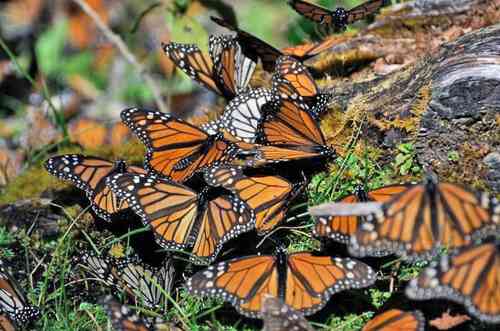▲ The monarch butterfly has been listed in NOM 059 as threatened or endangered for more than two decades.Photo courtesy Abel Cruz Reséndiz
Angelica Enciso L.
Newspaper La Jornada
Monday, August 15, 2022, p. 13
In the country there are 49 species considered extinct, 475 endangered and 896 threatened, but the vaquita marina stands out, an endemic species, for which strategies have been established for at least two decades that have not achieved its recovery, experts say.
The monarch butterfly, the leatherback sea turtle, the Mexican axolotl, the scarlet macaw, the sea cucumber, the jaguar and the white monkey orchid, despite having been listed in NOM 059 as threatened or endangered for more than two decades , have not recovered, says Alejandro Olivera, from the Center for Ecological Diversity.
In an analysis of the most iconic Mexican species, he mentions that habitat loss, poaching and illegal trade, as well as climate change, continue to be the main threats to the species, in addition to the fact that the Mexican government, in many cases, it does not comply with existing laws and regulations intended to protect species such as the vaquita.
In the recount Two decades of collective efforts for the conservation of the vaquita marina, the World Wide Fund for Nature (WWF) recalls that in 1997 the population of the cetacean was estimated at 567 individuals, in 2008 there were 256 and since then the decline in numbers accelerated.
The main threat to the vaquita is accidental death during fishing activities. Between 1985 and 1992, scientists performed necropsies on 128 specimens and discovered that all of them died in fishing nets in which they were entangled. Those nets are set for the totoaba fishery, which has accelerated the rate of decline of the vaquita from bycatch, says WWF.
He adds that the totoaba is also almost extinct due to international demand for its swim bladder or crop, which is trafficked to Asia through routes that include the United States, and is marketed as medicinal product or symbol of status and wealth
. In 2016, a kilo of totoaba bladder was auctioned in China for one hundred thousand dollars, hence its other popular nickname of cocaine from the sea
.
The organization points out that despite numerous efforts by the Mexican government, fishing communities, social organizations and academia, it has not been possible to achieve a better standard of living for the communities in the area and the vaquita is on the verge of extinction
.
The jaguar faces illegal trafficking, trade, management and use in the Yucatan Peninsula, which is caused, among other causes, by irregularities in authorizations for the establishment of Wildlife Management Units and trade through social networks. This species is at risk of extinction and it is estimated that there are between 4 and 5 thousand specimens left in the country’s wildlife, more than half in this region, indicates the Global Fund Diagnosis of Illegal Jaguar Trafficking in the Yucatan Peninsula. for Nature and the Mexican Association of Mammalogy.
Meanwhile, the 22 species of parrots and macaws that exist in the country are in some category of risk. Half of the species are classified as endangered, but illegal trafficking fell 47 percent after the ban decreed in 2008, said specialists from the organizations Defenders of Wildlife of Mexico, Teyeliz and the Autonomous University of Baja California Sur.
















